30-Day Study Plan for Political Science Class 11 | Political Science Class 11 - Humanities/Arts PDF Download
| Table of contents |

|
| Week 1: Foundation Building |

|
| Week 2: Deepening Understanding |

|
| Week 3: Advanced Concepts and Practice |

|
| Week 4: Revision and Mock Tests |

|
| Tips for Success |

|
The Political Science Class 11 curriculum, aligned with the NCERT syllabus, is divided into two parts: Indian Constitution at Work and Political Theory. It covers the foundations of the Indian Constitution, governance structures, and key political concepts such as freedom, equality, and secularism. This 30-day study plan is designed to help you systematically cover the syllabus, deepen your understanding, and prepare effectively for CBSE exams. By integrating NCERT textbooks, chapter notes, mind maps, flashcards, and practice papers, the plan ensures comprehensive learning, regular practice, and thorough revision to excel in your exams.
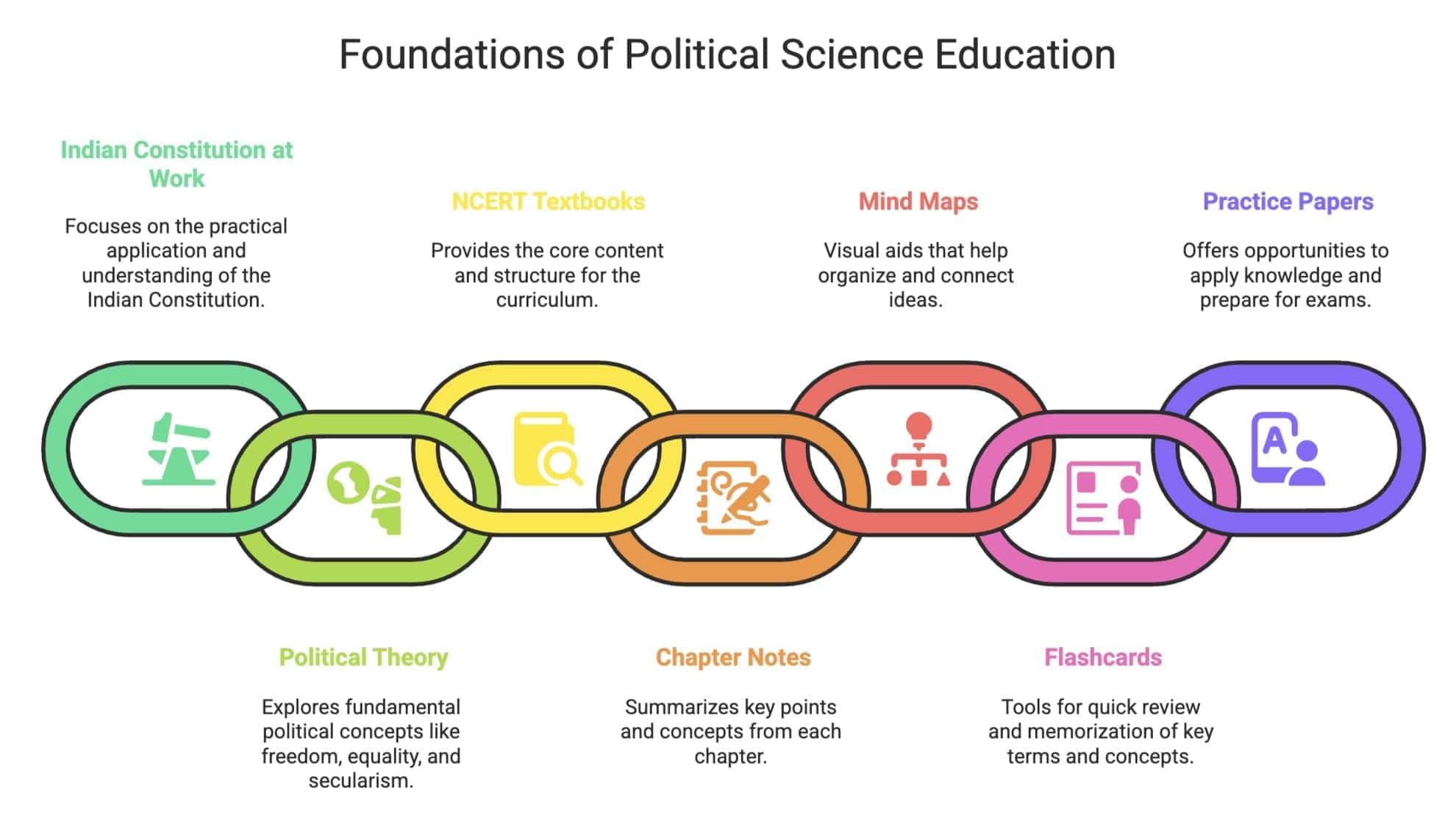
Week 1: Foundation Building
Day 1: Syllabus Overview and Constitution: Why and How?
Familiarise yourself with the syllabus and begin with the making and purpose of the Indian Constitution.
- Read: Syllabus: Political Science for Class 11
- Read: NCERT Textbook - Constitution: Why and How?
- Watch: What is a Constitution?
- Practice: Short Questions With Answers - Constitution: Why And How?
Day 2: Rights in the Indian Constitution
Study fundamental rights, duties, and directive principles of state policy.
- Read: NCERT Textbook - Rights in the Indian Constitution
- Study: Chapter Notes: Rights in the Indian Constitution
- Watch: Fundamental Rights in the Indian Constitution
- Practice: Short Questions With Answers - Right In The Indian Constitution
Day 3: Election and Representation
Understand the Indian electoral system and the role of the Election Commission.
- Read: NCERT Textbook - Election and Representation
- Study: Chapter Notes: Election & Representation
- Watch: Indian Electoral System
- Practice: Test: Election and Representation- 1
Day 4: Executive
Explore the roles and powers of the executive in India.
- Read: NCERT Textbook - Executive
- Study: Chapter Notes: Executive
- Watch: Parliamentary Executive in India
- Practice: Test: Executive- 1
Day 5: Legislature
Learn about the structure and functions of the Indian Parliament.
- Read: NCERT Textbook - Legislature
- Study: Chapter Notes: Legislature
- Watch: Functions of Parliament
- Practice: Test: Legislature -1
Day 6: Judiciary
Understand the role and powers of the Indian judiciary.
- Read: NCERT Textbook - Judiciary
- Study: Chapter Notes: Judiciary
- Watch: Indian Judiciary
- Practice: Test: Judiciary
Day 7: Federalism
Study the federal structure of India and its key features.
- Read: NCERT Textbook - Federalism
- Study: Chapter Notes: Federalism
- Watch: Federal System in India
- Practice: Test: Federalism - 1
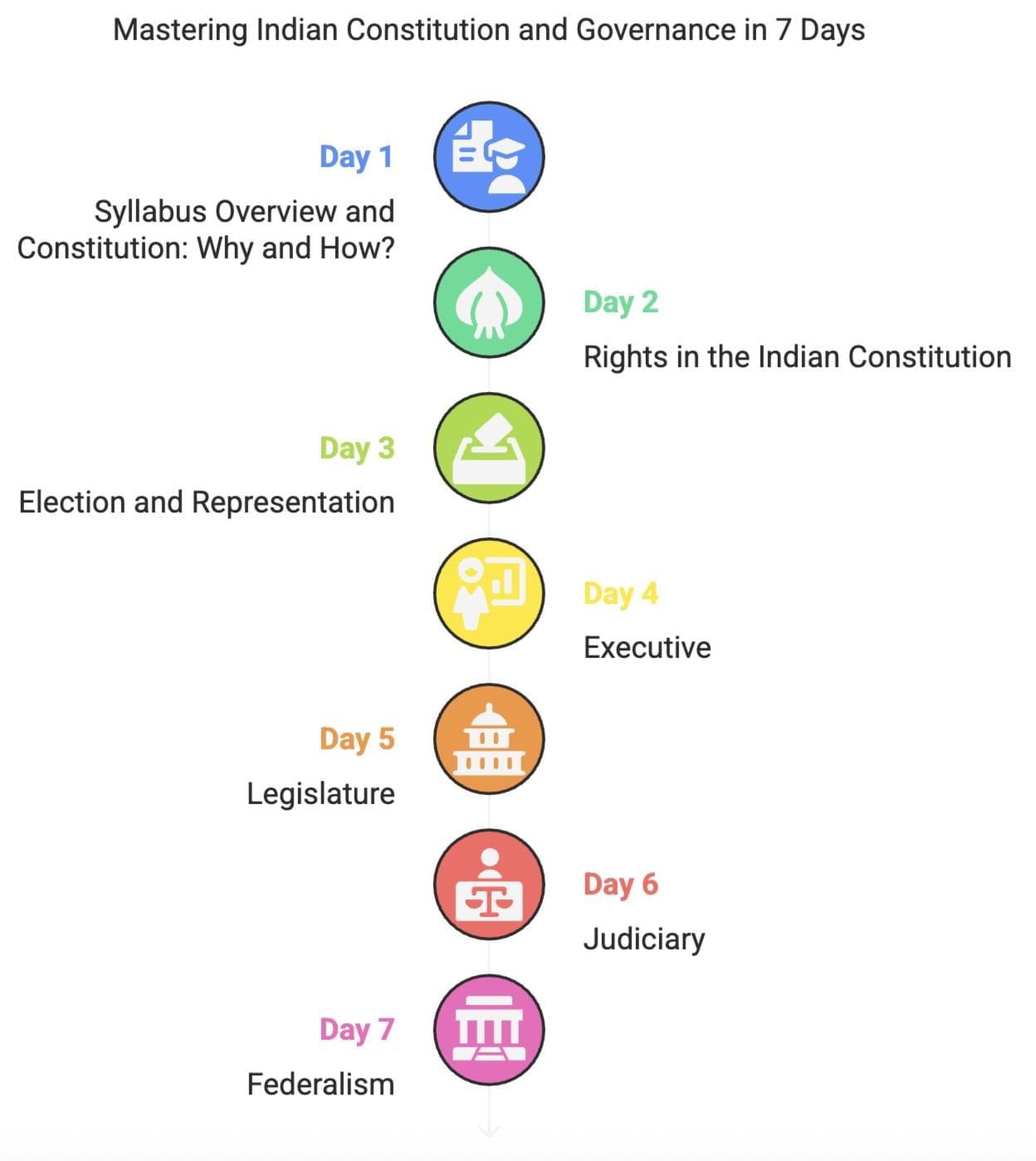
Week 2: Deepening Understanding
Day 8: Local Governments
Explore the structure and significance of local governance in India.
- Read: NCERT Textbook - Local Governments
- Study: Chapter Notes: Local Governments
- Watch: What is Local Government?
- Practice: Test: Local Governments
Day 9: Constitution as a Living Document
Learn about constitutional amendments and the dynamic nature of the Constitution.
- Read: NCERT Textbook - Constitution as a Living Document
- Study: Chapter Notes: Constitution as a living document
- Watch: Amendment of the Indian Constitution
- Practice: Test: Constitution As A Living Document - 1
Day 10: The Philosophy of Constitution
Understand the guiding values and philosophy behind the Indian Constitution.
- Read: NCERT Textbook - The Philosophy of Constitution
- Study: Chapter Notes: The Philosophy of Constitution
- Watch: Guiding Values and Philosophy of Indian Constitution
- Practice: Test: The Philosophy Of Constitution
Day 11: Political Theory: An Introduction
Begin Political Theory by exploring its scope and significance.
- Read: NCERT Textbook - Political Theory: An Introduction
- Study: Chapter Notes: Political Theory: An Introduction
- Watch: What is Political Theory?
- Practice: Test: Political Theory: An Introduction
Day 12: Freedom
Study the concept of freedom and its implications in political theory.
- Read: NCERT Textbook - Freedom
- Study: Chapter Notes: Freedom
- Watch: Freedom of Expression
- Practice: Test: Freedom
Day 13: Equality
Explore the concept of equality and its various dimensions.
- Read: NCERT Textbook - Equality
- Study: Chapter Notes: Equality
- Watch: What is Equality?
- Practice: Test: Equality
Day 14: Social Justice
Understand the principles of social justice and their application.
- Read: NCERT Textbook - Social Justice
- Study: Chapter Notes: Social Justice
- Watch: What is Justice?
- Practice: Test: Social Justice
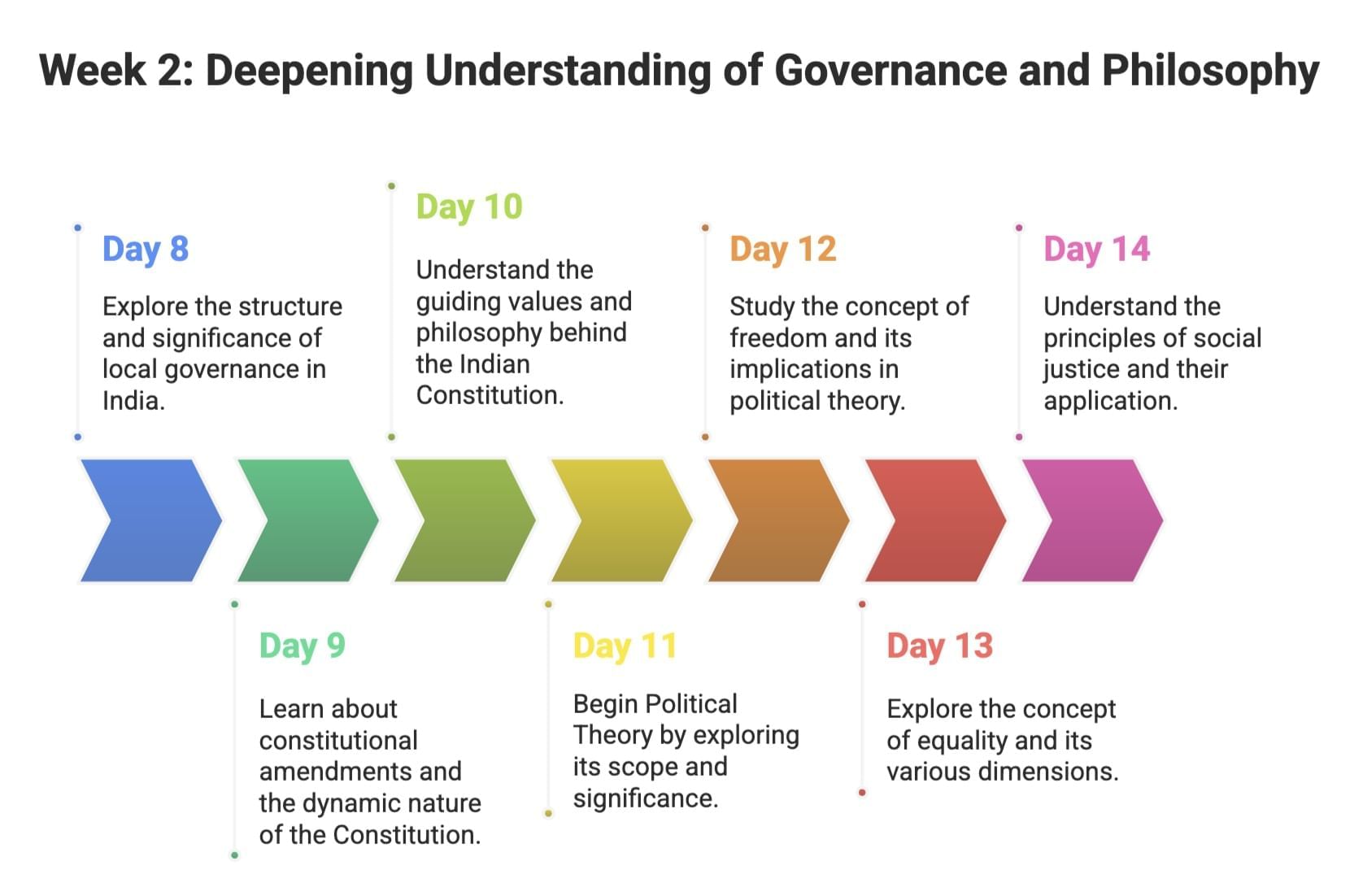
Week 3: Advanced Concepts and Practice
Day 15: Rights
Study the concept of rights in political theory.
- Read: NCERT Textbook - Rights
- Study: Chapter Notes: Rights
- Watch: What are Rights
- Practice: Test: Rights
Day 16: Citizenship
Explore the concept of citizenship and its global dimensions.
- Read: NCERT Textbook - Citizenship
- Study: Chapter Notes: Citizenship
- Watch: Global Citizenship
- Practice: Test: Citizenship
Day 17: Nationalism
Understand nationalism and its significance in political theory.
- Read: NCERT Textbook - Nationalism
- Study: Chapter Notes: Nationalism
- Watch: What is Nationalism?
- Practice: Test: Nationalism - 1
Day 18: Secularism
Study the concept of secularism, particularly in the Indian context.
- Read: NCERT Textbook - Secularism
- Study: Chapter Notes: Secularism
- Watch: Is The Indian State really Secular?
- Practice: Test: Secularism - 1
Day 19: Case-Based Questions
Practice case-based questions for all Part A chapters.
- Practice: Test: Constitution: Why and How?- Case Based Type Questions
- Practice: Test: Legislature- Case Based Type Questions
- Practice: Test: Local Governments- Case Based Type Questions
Day 20: Case-Based Questions for Political Theory
Practice case-based questions for Part B chapters.
- Practice: Test: Political Theory: An Introduction- Case Based Type Questions
- Practice: Test: Freedom- Case Based Type Questions
- Practice: Test: Social Justice- Case Based Type Questions
Day 21: Previous Year Questions (PYQs)
Solve previous year papers to understand exam patterns.
- Practice: Class 11 Political Science Previous Year Paper - 1
- Practice: Class 11 Political Science Previous Year Paper - 2
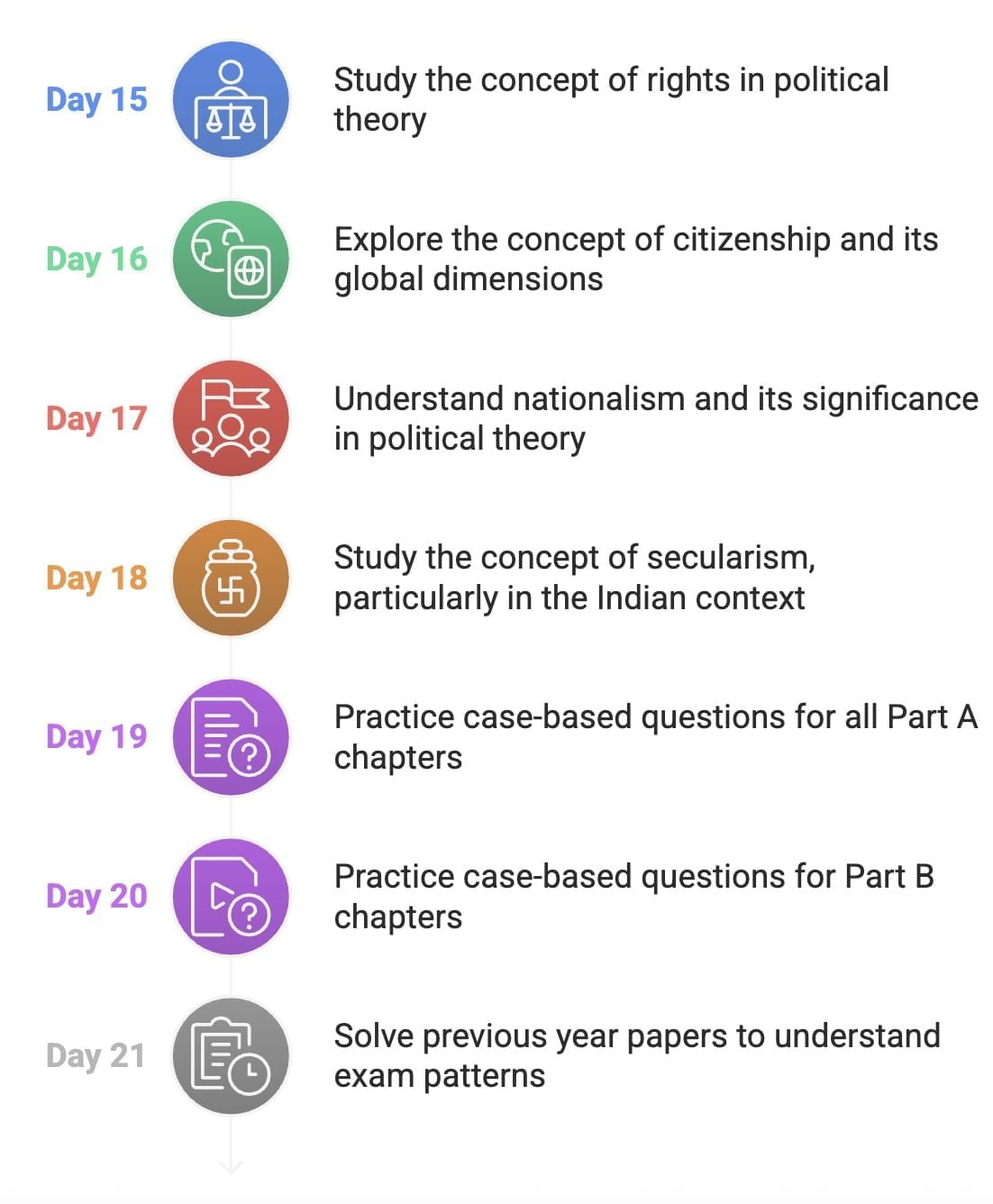
Week 4: Revision and Mock Tests
Day 22: Revise Constitution: Why and How? and Rights
Review the Constitution’s formation and fundamental rights.
- Revise: Revision Notes: Constitution: Why and How?
- Revise: Revision Notes: Rights in the Indian Constitution
- Practice: NCERT Solutions - Constitution: Why and How?
Day 23: Revise Election and Representation and Executive
Review the electoral system and the executive’s role.
- Revise: Revision Notes: Election and representation
- Revise: Revision Notes: Executive
- Practice: NCERT Solutions - Election and Representation
Day 24: Revise Legislature and Judiciary
Review the roles of Parliament and the judiciary.
- Revise: Revision Notes: Legislature
- Revise: Revision Notes: Judiciary
- Practice: NCERT Solutions - Legislature
Day 25: Revise Federalism and Local Governments
Review federalism and local governance structures.
- Revise: Revision Notes: Federalism
- Revise: Revision Notes: Local Governments
- Practice: NCERT Solutions - Federalism
Day 26: Revise Constitution as a Living Document and Philosophy
Review the dynamic nature and philosophy of the Constitution.
- Revise: Revision Notes: Constitution as a living document
- Revise: Revision Notes: The Philosophy of Constitution
- Practice: NCERT Solutions - Constitution as a Living Document
Day 27: Revise Political Theory Chapters
Review key concepts from Political Theory using flashcards and mind maps.
- Revise: Revision Notes: Political Theory: An Introduction
- Revise: Flashcards: Freedom
- Revise: Mind Map: Social Justice
Day 28: Full-Length Mock Test
Take a full-length mock test to simulate exam conditions.
- Practice: Political Science: CBSE Sample Question Paper (2023-24) - 1
- Practice: Political Science: CBSE Sample Question Paper (2023-24) - 2
Day 29: Revise Weak Areas and Use Cheat Sheets
Focus on weak areas identified in the mock test and use cheat sheets for quick revision.
- Revise: Cheat Sheet: Constitution: Why and How?
- Revise: Cheat Sheet: Equality
- Practice: Solve 10-15 questions from weak areas.
Day 30: Final Mock Test and Relaxation
Take another full-length mock test and relax to build confidence.
- Practice: Political Science: CBSE Sample Question Paper (2023-24) - 3
- Review: Analyse performance and ensure readiness.
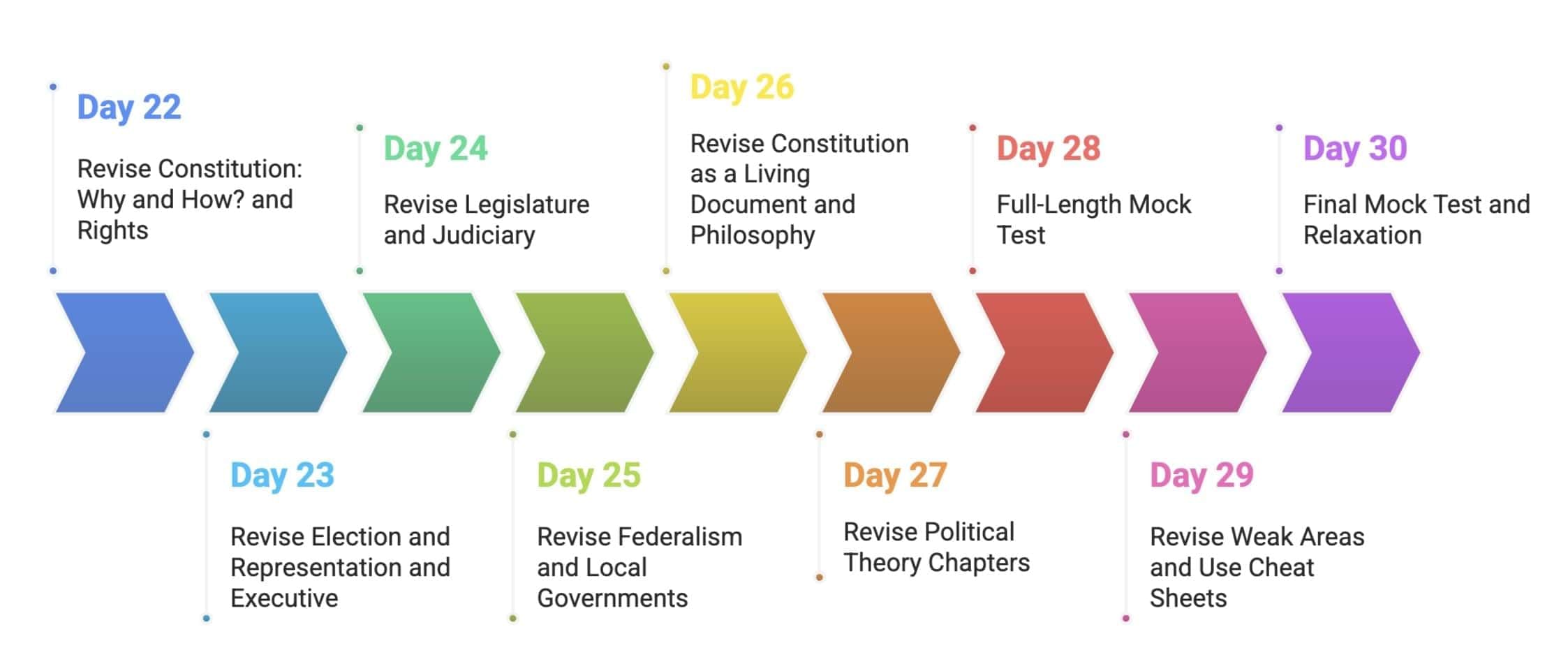
Tips for Success
- Prioritise NCERT: Focus on NCERT textbooks as they form the core of the syllabus.
- Practice Case-Based Questions: Solve case-based and passage-based questions to prepare for analytical sections.
- Use Visual Aids: Leverage mind maps, flashcards, and cheat sheets for quick revision.
- Analyse Past Papers: Review CBSE sample papers and PYQs to understand question patterns and improve answer writing.
- Time Management: Stick to a disciplined schedule for reading, practising, and revising.
- Stay Updated: Refer to recent constitutional amendments for relevant chapters.
- Stay Positive: Take short breaks to avoid burnout and maintain confidence.
|
44 videos|373 docs|50 tests
|
FAQs on 30-Day Study Plan for Political Science Class 11 - Political Science Class 11 - Humanities/Arts
| 1. What are the key topics covered in the Foundation Building week of the 30-Day Study Plan for Political Science Class 11 Humanities/Arts? |  |
| 2. How can students deepen their understanding of political science during the second week of the study plan? |  |
| 3. What advanced concepts should students focus on in the third week of the study plan? |  |
| 4. What strategies can be employed during the Revision and Mock Tests week to ensure effective preparation? |  |
| 5. What general tips for success can students follow throughout their 30-day study plan for political science? |  |



















